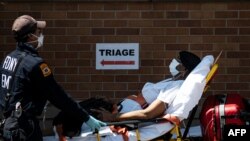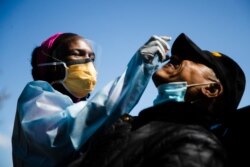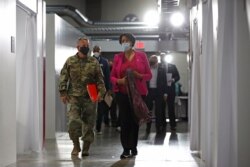Sitting outside an urgent care medical center, Michelle Thomas feels sick. She traveled 30 minutes across town from her Washington, D.C., neighborhood to seek treatment for a persistent cough and fever. Both are common symptoms for COVID-19 in a city that has lost at least 400 residents to the pandemic.
“There’re no doctors’ offices in my neighborhood. I really don’t see a doctor regularly and wouldn’t know what to do if I got the virus,” Thomas told VOA.
The 73-year-old retired schoolteacher is like millions of African Americans who have long-struggled to access adequate health care. Now, her concerns are heightened.
“I know my age and health problems put me at greater risk for serious illness from the virus,” she said.
Thomas’s plight comes as COVID-19 has proved especially deadly for many minority communities in America. Nationwide, more than 20,000 African Americans have died from the coronavirus, according to the American Public Media (APM) Research Lab. Authors of the survey acknowledged the numbers were incomplete because some states have not reported data broken down by race and ethnicity.
Even so, APM’s data show the black mortality rate from COVID-19 is three times higher than that of white people. Researchers believe minorities are more at risk of catching the virus because they disproportionately hold jobs for which teleworking and staying at home is not an option.
Snapshots of uneven health care
Many longtime health care practitioners in urban areas say the pandemic has highlighted chronic shortcomings in health care delivery — and health outcomes — in African American neighborhoods.
“In D.C. neighborhoods, where 95% of the residents are black, the life expectancy is 72 years old. But just a few miles away in predominantly white neighborhoods, it is 87,” said Dr. Wayne Frederick, a surgical oncologist and president of Howard University, in Washington. “So, when you start looking at all the social determinants of health in both areas, you begin to see why the discrepancies exist.”
In a city where in 2018, African Americans were estimated at 46% of the population, the Department of Health reports they account for 77% of COVID-19 deaths. By comparison, whites make up about 42% of city residents but just 11% of COVID-19 deaths. Nationwide, African Americans comprise 13% of the U.S. population. A survey from 40 states and the District of Columbia found that black people account for 27% of COVID-19 deaths.
"This virus has not left the District," Washington Mayor Muriel Bowser said at a recent news conference. “We are working at building a healthy community and (to) improve access to better health care.”
Decades of research show that many African Americans go untreated or undertreated for diabetes, hypertension and other medical conditions that add to the mortality risk for COVID-19. The problem extends to the nation’s capital, where in 2019, the federal government estimated that 97% of residents had some form of health insurance.
Frederick blames poor health outcomes on a dearth of medical facilities in African American communities.
“In one of the biggest populated black D.C. neighborhoods, there’s only one acute care facility, which is functioning at a very low level. And most of the acute care facilities are in the other neighborhoods,” he said. “It's not a matter of not having health insurance. It's a matter of having access to doctors’ facilities and other health care providers.”
Some African American leaders are calling for more government spending directed at preventive care and coronavirus testing in black communities.
“If you spend as much money on the lower tier of the health care outcomes, you actually help the entire system,” Frederick said. “We need more doctors and ambulatory care services in black neighborhoods.” He noted that Howard University’s medical school graduates more than 100 physicians every year, some of whom set up practices in underrepresented neighborhoods.
In the short term, health officials are scrambling to increase testing and contact tracing in minority communities to slow down rates of infection.
As Washington resident Thomas waits for her bus home, she said she hopes people in her community take the virus seriously.
“I don’t want to see more people die,” she said.






